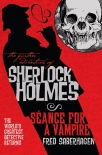Séance for a Vampire by Fred Saberhagen (ebook reader macos .TXT) 📕

Read free book «Séance for a Vampire by Fred Saberhagen (ebook reader macos .TXT) 📕» - read online or download for free at americanlibrarybooks.com
- Author: Fred Saberhagen
Read book online «Séance for a Vampire by Fred Saberhagen (ebook reader macos .TXT) 📕». Author - Fred Saberhagen
With our own vessel berthed, we disembarked amid dense fog and intermittent rain, conditions almost identical to those under which we had left Hull. Under Armstrong’s guidance we had little difficulty in finding our way about the Russian capital. Our party took rooms at the Hotel de l’Europe. Here our windows overlooked Nevsky Prospekt, the great boulevard which runs for two and a half miles through the city’s heart. When the fog cleared, which it soon did, the view was quite impressive. We saw the avenue thronged with people under black umbrellas, both of its sides lined by palaces and churches, by business establishments and government buildings of all sorts.
There were an amazing number of uniforms to be seen among the native populace, and no immediate way for the stranger to know which type of costume belonged to high officials and which to mere minor functionaries.
The hotel stood on the north side of the boulevard, less than half a mile east of the Kazan Cathedral, whose colonnade had been copied from that of St. Peter’s in Rome, and whose interior boasted the regimental flags and imperial eagles captured from the ravaged army of Napoleon. A block past the cathedral, one reached the luxurious shops of the Morskaya, where I almost thought I might have been in Paris.
Traffic here kept to the right, which added yet another minor strain to our difficulties.
A mile to our north and out of sight from our hotel, on the far bank of the broad Neva, there rose the sullen, dun-colored walls of the Fortress of Peter and Paul, at once a stronghold and a prison. Towering four hundred feet above those walls, and visible from most parts of the city, rose the slender golden spire marking the site of the cathedral contained within the fortress.
For three miles along the southern bank of the Neva ran a solid quay of pink Finnish granite, lined on its inland side by the Winter Palace, the Admiralty, the foreign embassies, and the palaces of the great nobles, and the wealthy merchants and landowners.
Currently the Russian capital was a city of about a million and a half people. This made it not as large as London, but still to be classified as one of the great cities of Europe and the world. And from the bustle of commerce along the quays, and the evident respect shown toward the monarchy by most of the people, it was plain that their Majesties Nicholas and Alexandra were still secure on their thrones, despite the continual ferment of terrorists seeking to incite revolution.
The Winter Palace, a huge and, as one might expect, an imposing edifice, built in the eighteenth century by the Empress Elizabeth, was seldom occupied by royalty at this season of the year. The Tsar and Tsarina, as Armstrong informed us, were in the habit of spending their summers at Tsarskoe Selo, the Tsar’s village, a construction of fantastic extravagance fifteen miles south of St. Petersburg. This miniature domain had been called “a world apart,” and “an enchanted fairyland.” Eight hundred acres of green lawn–well over a square mile–in the imperial park, delighted the four daughters of the imperial family, Olga, Tatiana, Maria, and Anastasia, whose ages were eight to two, respectively.
The horse-drawn tram had not yet been replaced by the electric vehicle, and motorcars were much more a rarity than in the vicinity of London. Rubber-tired carriages were fairly common in the summer, and the main streets, at least, were all smoothly paved.
Now we put into action, as best we could, the plans which we had made aboard ship. We were each of us to seek out our professional contemporaries in St. Petersburg, and endeavor to find out what we could about our quarry.
Dracula mentioned casually that there might be in the St. Petersburg area some local vampires with whom he could establish useful contact. “Most likely it will be something indirect–I have a place to start, the name of a certain breathing friend of an old friend.”
Zubatov, then the head of the Tsarist secret police, acquainted with Sherlock Holmes at least by reputation, was obviously a powerful man, important either as friend or foe; and Holmes would pursue his own inquiries by that means.
Armstrong felt almost at home in St. Petersburg, having spent much of the previous winter and spring in the city in the course of his duties as international correspondent for his American newspaper. He had found the place interesting, and had enjoyed many aspects of the local society. Others, such as the official censorship, were extremely distasteful. but mainly he had suffered by being separated from Louisa, until, to his joy, he had been reassigned to London.
For my part I endeavored, though I met with little success, to establish some contacts among the local medical community, by means of shared interests or mutual acquaintances. One friend of a friend turned up unexpectedly–a Russian who had been doing research on plague, in Paris, but his knowledge of Count Kulakov, or of anyone who might know the count, proved to be nil. From my new acquaintance, I learned little more than that this city had been called “the babylon of the Snows,” or sometimes “the Venice of the North”—the latter because of the number of canals and natural waterways.
I learned also, that in summer, cholera was always a serious concern. It was important to make sure that



Comments (0)